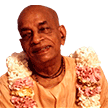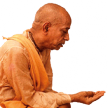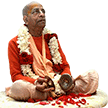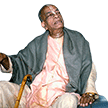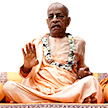Vaisnava Philosophy - an essential subject: Difference between revisions
(Created page with "Category:Essential Subjects <!----------------------- edit below this line -----------------------> <!------------------------ begin introduction text below --------------...") |
(Vanibot #0041: Moves Choose Another box to the end) |
||
| Line 2: | Line 2: | ||
<!----------------------- edit below this line -----------------------> | <!----------------------- edit below this line -----------------------> | ||
<!------------------------ begin introduction text below ------------------------> | <!------------------------ begin introduction text below ------------------------> | ||
Vaisnava philosophy is very simple: Kṛṣṇa is the Supreme Personality of Godhead and everyone is His servant. Nobody can be equal to or greater than Kṛṣṇa. Yet they are simultaneously one and different. In quality they are one, but in magnitude they are different. | |||
Srila Prabhupada's books, lectures, conversations and letters offer a comprehensive presentation of this essential subject as seen in the Vaniquotes '''[[Vaniquotes:Category:Vaisnava Philosophy|Vaisnava Philosophy]]''' category. An introduction from his books is given below in the following | Srila Prabhupada's books, lectures, conversations and letters offer a comprehensive presentation of this essential subject as seen in the Vaniquotes '''[[Vaniquotes:Category:Vaisnava Philosophy|Vaisnava Philosophy]]''' category. An introduction from his books is given below in the following 9 quotes. | ||
<!-------- end introduction text and don't touch next three lines ---------> | <!-------- end introduction text and don't touch next three lines ---------> | ||
---- | ---- | ||
== Quotes from Srila Prabhupada's books == | == Quotes from Srila Prabhupada's books == | ||
<!----------------- edit quote boxes below this line -----------------> | <!----------------- edit quote boxes below this line -----------------> | ||
{{VaniQuotebox| | {{VaniQuotebox|Krsna is the origin of all visnu-tattvas, including Maha-Visnu, Garbhodakasayi Visnu and Ksirodakasayi Visnu. He is the ultimate goal of Vaisnava philosophy. Everything emanates from Him. His body is completely spiritual|Kṛṣṇa is the origin of all viṣṇu-tattvas, including Mahā-Viṣṇu, Garbhodakaśāyī Viṣṇu and Kṣīrodakaśāyī Viṣṇu. He is the ultimate goal of Vaiṣṇava philosophy. Everything emanates from Him. His body is completely spiritual and is the source of all spiritual being. Although He is the source of everything, He Himself has no source. '''(Caitanya-caritāmṛta, Madhya-līlā 20.153)'''}} | ||
{{VaniQuotebox| | {{VaniQuotebox|According to the Vaisnava philosophy, a devotee is as good as Narayana not by becoming Narayana but by becoming the most confidential servant of Narayana|According to the Vaiṣṇava philosophy, a devotee is as good as Nārāyaṇa not by becoming Nārāyaṇa but by becoming the most confidential servant of Nārāyaṇa. Such great personalities act as spiritual masters for the benefit of the people in general, and as such, a spiritual master who is preaching the glories of Nārāyaṇa should be accepted as Nārāyaṇa and be given all respects due Him. '''(Śrīmad-Bhāgavatam 4.22.16)'''}} | ||
{{VaniQuotebox| | {{VaniQuotebox|According to the Vaisnava philosophy, the master is one, and the servants are also one, but the distinction between the master and servant must continue even in the liberated stage|According to the Vaiṣṇava philosophy, the master is one, and the servants are also one, but the distinction between the master and servant must continue even in the liberated stage. In the conditioned stage we think that some living beings are our friends whereas others are enemies, and thus we are in duality. '''(Śrīmad-Bhāgavatam 7.5.11)'''}} | ||
{{VaniQuotebox| | {{VaniQuotebox|If from the beginning of life one is taught the Vaisnava philosophy of duality or variety, the monistic philosophy will not bother him very much. In reality, everything is an emanation from the supreme source|If from the beginning of life one is taught the Vaiṣṇava philosophy of duality or variety, the monistic philosophy will not bother him very much. In reality, everything is an emanation from the supreme source (janmādy asya yataḥ (SB 1.1.1)). The original energy is exhibited in varieties, exactly as the sunshine, the original energy emanating from the sun, exhibits itself in variety as light and heat. '''(Caitanya-caritāmṛta, Ādi-līlā 14.33)'''}} | ||
{{VaniQuotebox| | {{VaniQuotebox|Some philosophers say that the manifestation of material nature is false, but according to the philosophy of Bhagavad-gita or according to the philosophy of the Vaisnavas, this is not so|The Lord, the living entities, material nature and time are eternal. The manifestation of prakṛti may be temporary, but it is not false. Some philosophers say that the manifestation of material nature is false, but according to the philosophy of Bhagavad-gītā or according to the philosophy of the Vaiṣṇavas, this is not so. The manifestation of the world is not accepted as false; it is accepted as real, but temporary. '''(Śrīmad-Bhāgavatam, Introduction)'''}} | ||
{{VaniQuotebox| | {{VaniQuotebox|The Vaisnava philosoph recommends yukta-vairagya. It is not that all attention should be diverted for the maintenance of the body, but at the same time one's bodily maintenance should not be neglected|The Vaiṣṇava philosophy therefore recommends yukta-vairāgya. It is not that all attention should be diverted for the maintenance of the body, but at the same time one's bodily maintenance should not be neglected. As long as the body exists one can thoroughly study the Vedic instructions, and thus at the end of life one can achieve perfection. '''(Śrīmad-Bhāgavatam 8.19.39)'''}} | ||
{{VaniQuotebox| | {{VaniQuotebox|Vaisnava philosophy first of all pays obeisances to and worships the internal pleasure potency of the Supreme Lord. Thus the Lord and His potency are always referred to as Radha-Krsna|Vaiṣṇava philosophy first of all pays obeisances to and worships the internal pleasure potency of the Supreme Lord. Thus the Lord and His potency are always referred to as Rādhā-Kṛṣṇa. Similarly, those who worship Nārāyaṇa first of all utter the name of Lakṣmī, as Lakṣmī-Nārāyaṇa. Similarly, those who worship Lord Rāma first of all utter the name of Sītā. In any case—Sītā-Rāma, Rādhā-Kṛṣṇa, Lakṣmī-Nārāyaṇa—the potency always comes first. '''(Caitanya-caritāmṛta, Ādi-līlā Introduction)'''}} | ||
{{VaniQuotebox| | {{VaniQuotebox|Those who follow the Mayavadi philosophy, headed by Sripada Sankaracarya, accept only one rod, but those who follow the Vaisnavite philosophy accept three combined rods|There are two types of sannyāsīs. Those who follow the Māyāvādī philosophy, headed by Śrīpāda Śaṅkarācārya, accept only one rod (eka-daṇḍa), but those who follow the Vaiṣṇavite philosophy accept three combined rods (tri-daṇḍa). The Māyāvādī sannyāsīs are ekadaṇḍi-svāmīs, whereas the Vaiṣṇava sannyāsīs are known as tridaṇḍi-svāmīs, or more distinctly, tridaṇḍi-gosvāmīs, in order to be distinguished from the Māyāvādī philosophers. '''(Śrīmad-Bhāgavatam 1.13.30)'''}} | ||
{{VaniQuotebox|According to the Vaisnava philosophy the present situation is not false but temporary. It is like a dream|According to the Vaiṣṇava philosophy, however, the present situation is not false but temporary. It is like a dream. A dream does not exist before one falls asleep, nor does it continue after one awakens. The period for dreaming exists only between these two, and therefore it is false in the sense that it is impermanent. Similarly, the entire material creation, including our own creation and those of others, is impermanent. '''(Śrīmad-Bhāgavatam 6.15.5)'''}} | |||
<!----------------- edit quote boxes above this line -----------------> | <!----------------- edit quote boxes above this line -----------------> | ||
| Line 31: | Line 33: | ||
'''Vaisnava Philosophy - [[Vaniquotes:Category:Vaisnava Philosophy|explore more within this category]]'''. | '''Vaisnava Philosophy - [[Vaniquotes:Category:Vaisnava Philosophy|explore more within this category]]'''. | ||
{{EsentialSubjectTotal}} | {{EsentialSubjectTotal}} | ||
<div style="float:left;"> | |||
{{EssentialSubjectnav}} | |||
</div> | |||
__NOTOC__ | __NOTOC__ | ||
__NOEDITSECTION__ | __NOEDITSECTION__ | ||
Latest revision as of 18:05, 22 November 2020
Vaisnava philosophy is very simple: Kṛṣṇa is the Supreme Personality of Godhead and everyone is His servant. Nobody can be equal to or greater than Kṛṣṇa. Yet they are simultaneously one and different. In quality they are one, but in magnitude they are different.
Srila Prabhupada's books, lectures, conversations and letters offer a comprehensive presentation of this essential subject as seen in the Vaniquotes Vaisnava Philosophy category. An introduction from his books is given below in the following 9 quotes.
Quotes from Srila Prabhupada's books
Vaisnava Philosophy - explore more within this category.
Vanipedia has now over 903 introductory articles compiled from Srila Prabhupada's books under the series titled Essential Subjects. All these articles can be seen in the Table of Content on the right side of this article and also here in this Umbrella Category. Browse through them to relish the breadth and depth of Srila Prabhupada's teachings - There is a subject for everyone.
